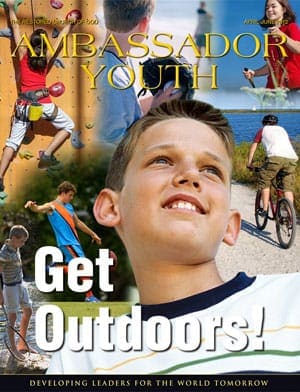âWANTED: fun-loving, adventure-seeking teens. Desperately need youths to enjoy themselves. Candidates must not be allergic to fresh air, sunlight or fun. Successful applicants will participate in a range of exciting activities, develop better health, make friends, and lead fulfilling lives. Serious and eager teens should get outdoors!â
To a young person 60 years ago, this sort of advertisement would seem utterly redundant. Why? Almost certainly, his or her plans would have already included being outsideâworking in the garden, riding a bicycle across town to the public library, tromping through nearby woods, or simply reading a book under a tree.

Source: Thinkstock
But imagine this ad appearing today. First, it would likely pop up on the side of an Internet webpage, and the average teen would only quickly skim the text, if he noticed it at all. Then, he would continue sitting at his desk, effortlessly sifting through news updates on Twitter, a steady stream of postings from 100-plus Facebook friendsâall while simultaneously spotting through an informational video on Impressionist paintings for an art history classâwhich leads to reading an online encyclopedia entry on French artist Claude Monet.
For the first time ever, the whole world is just a click of a button awayâand the Information Age has seemingly quickened the pace of life to warp speed.
Think of an average day. Perhaps you wake up in your home, are shuttled off to school in a bus or your parentsâ car, hurry from class to class, are back in the car in the afternoon, assist a parent with grocery shopping, which puts you back in the car, eat a meal at the dining room table, do homework in your bedroomâŚsoon you have had a good nightâs sleep and are awake the next morning to repeat your routine. Each day seems to go faster and faster, and there appears no way to break the relentless cycle.
Every once in a while, when things slow down for a moment, you probably have a nagging feeling something is missing.
Then it hits you: I have not really been outside for a long time.
With the Internet, shopping malls, and many other modern conveniences, we are hardly ever outside for extended periods of time. The world is now essentially built to be indoors almost around the clock. Often, our longest exposure to the sun might be the 30 seconds it takes to walk from the front door to the car. Also, with the hurried speed of life, it may seem there are not enough hours in a day.
You are not alone. Most adults feel the same way. We all know we would be healthier and happier if we were outside more oftenâyet we are quickly sucked back into the relentless cycle of moving from one indoor location to the next, and pushing hard to keep up with everything in our busy schedules.
But this does not have to be you. You can break free!
While it does take effort, regularly enjoying the outdoors is invaluable and can utterly change your life.
Recognize the Problem
The first part of âgetting outdoorsâ is knowing what is at stake. This generation is the least active of all time. According to a study published by the National Center for Biotechnology Information (NCBI), patterns of physical activity decrease considerably across the ages of nine to 15 years. The United States Centers for Disease Control and Prevention (CDC) reports that when students reach high school, about two-thirds are not meeting recommended levels of physical activity. Toward college, the amount of much needed exercise continues to fall another 20 percent (NCBI).
As poor eating habits and lack of physical activity increase, so does the risk of obesity, heart disease, diabetes and other health-related maladies.
In the past three decades, childhood obesity has more than tripled. âGloballyâŚup to 200 million school aged children are either overweight or obese, of those 40-50 million are classified as obeseâ (International Association for the Study of Obesity).
As a nation, the U.S. now has the most overweight children in human history. And the American lifestyle is being âexportedâ and copied all over the world.
On average, young people spend more than seven hours a day playing video games, using a computer, and watching television.
All of these activities have one thing in common: sitting down. The New York Times reported that as soon as you sit, electrical âactivity in the muscles dropsâŚleading to a cascade of harmful metabolic effects. Your calorie-burning rate immediately plunges to about one per minute, a third of what it would be if you got up and walked. Insulin effectiveness drops within a single day, and the risk of developing Type 2 diabetes rises.â (Read the related âTeen Newsâ section found in this issue to learn more.)
Even if you are a healthy weight, do exercise regularly, and strive to eat healthy foods, prolonged periods of sitting can wreak havoc on your health. Letâs face itâwhen indoors, the average person is usually sitting down.
Inactive lifestyles are a direct assault on the vibrancy, strength and boundless energy that used to be a trademark of youth. Being sedentary means a young man cannot fulfill Proverbs 20:29, which states, âThe glory of young men is their strengthâŚâ It also makes it impossible for a young woman to fulfill Proverbs 31:17, which states that she âgirds herself with strengthâ and âstrengthens her armsâ (New King James Version).
Abundant Benefits
Being outdoors does not just mean decreasing the time you are sitting. There are a multitude of benefits that come from venturing into the world found out the front door. These can be broken down into three categories.
(1) Physical Activity: I Timothy 4:8 states, âFor bodily exercise profits littleâŚâ This means that while exercise is important, it only lasts for a short time, so you must do it regularly.
Generally, being outdoors requires physical movementâeverything from a slow walk, to sprinting, to playing a sport.
Regular exercise helps maintain healthy bodies, as well as aids in reducing anxiety and depression. In addition, medical studies have shown that frequent physical activity can improve academic performance.
(2) Fresh Air: While inside, the air you breathe will usually be âstaleâ and processed through air-conditioners or heating systems. Due to this, we often forget the invigorating feeling of a deep breath of oxygen-rich fresh air.
According to the Occupational Safety & Health Administration, if you spend an inordinate amount of time indoors, you are more likely to suffer âheadaches, fatigue, trouble concentrating, and irritation of the eyes, nose, throat and lungs.â
Most young people spend up to six hours a day in classrooms and they go home and spend more time in front of a television or computer. In the process, they may be slowly harming themselves by breathing in mildly toxic air and depriving their bodies of the clean oxygen they need to function properly.
Even exercising inside is less effective. The scientific journal Environmental Science and Technology reported, âCompared with exercising indoors, exercising in natural environments was associated with greater feelings of revitalization and positive engagement, decreases in tension, confusion, anger, and depression, and increased energyâŚParticipants reported greater enjoyment and satisfaction with outdoor activity and declared a greater intent to repeat the activity at a later date.â
(3) Sunshine: It is no accident that when we go outside, we feel great! This principle is also found in the Bible: âThe light is pleasant, and it is good for the eyes to see the sunâ (Ecc. 11:7, New American Standard Version).
Obviously this does not mean you should stare directly at the sun! But there are medical benefits from exposure to sunlight. It activates and helps release chemicals in our brains that make us feel fantastic. Also, it reacts with skin to produce a chemical called vitamin D. This compound is essential for healthy bone growth and calcium absorption in human bodies. Among numerous well-documented benefits, vitamin D has been found to:
- assist the immune system.
- lower the risk of high blood pressure, osteoporosis, Alzheimerâs disease, and many cancers.
- help lower cholesterol.
While vitamin D can be taken as a supplement and is found in fish, the most cost-effective way to receive your daily requirement is to step outside on a sunny day.
Wholesome Activities
Getting fresh air and sunlight can involve a whole lot more than simply exercising outdoorsâthe activities are almost limitless.
Set goals for walking, riding or running. Add interest to your exercise by adding purpose. Give yourself something to look forward to when you leave the house by picking a nearby destination. This could be a new park, a swimming pool, a shopping center, or a scenic location. As you become more fit with regular exercise, you will be able to pick spots farther away.
Try gardening. Summer afternoons in the garden can bring a huge sense of achievement. If your parents allow you to have a piece of ground, consider starting a âpizza garden.â You can easily grow everything you need for fresh toppings and a delicious tomato sauce. You can even grow an entire garden in flower pots or boxes.
Do not let a lack of knowledge stop you from developing a green thumbâthere are many books available, as well as how-to websites on the Internet.
Explore science. Discover the joy of chemistry and physics by conducting experiments outside. You can find an abundance of science ideas on the Internet to challenge yourself. For example, while making a homemade film-canister rocket fly 12 feet into the air is easy enoughâwhat variables could you change to make it go even higher? Or what design for a paper airplane will fly the farthest?
Be an artist. Godâs Creation is a great source for artistic ideas and resources. You could try painting or sketching. Sit under the shade of a tree and sketch a scene in nature.
You could also search for flowers or unusual leaves to preserve. Dried flowers can be used to make beautiful homemade cards or bookmarksâexcellent for gifts at the Feast of Tabernacles.
Interesting stones, rocks or branches can also be used to make various crafts, furnish fish tanks, or make garden sculptures.
Another idea is to take a photo safari by bringing your camera on a hike. Photography is a great skill to develop and the best subjects are found out and about. With practice, your skills could be used at Church socials or even for fundraising.
Be Creative!
With these options, personal favorite sports, and an innumerable amount of ideas online, you should never be bored or stuck inside during days off from school. Not only will you enjoy yourself more outside, but you might also inspire your friends as well.
Above all, think outside the box when scheduling activities outdoors. During summer vacation, it is relatively easy to find time for such activities. Use those few months to make a habit out of âbeing outside.â
When the school year begins, it can be another story. That period can often be summarized in one word: busy. Be creative with ways to work the outdoors into everyday activities. You could study for a test at a picnic table in a quiet public park. You could walk to a nearby location instead of riding in a car. You could mow the grass in spring, rake the leaves in fall, and shovel the snow from the driveway in winterâyour parents surely will not mind! Make every effort to leave the house regularly.
Your overall health and well-being are on the lineâget outdoors!



















